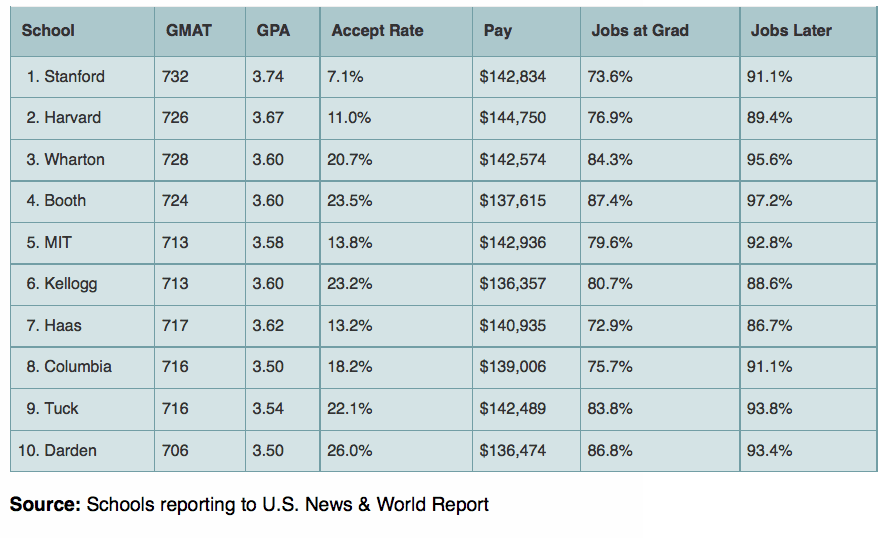
Ranks of business schools are very important indicators of which business schools are good. They help students to understand where they should apply for a qualification that is considered to be of a very high standard, and they give business schools food for thought in looking at ways to improve programs.
However, some of the indicators of a great school for MBAs have been questioned. Some argue that it is less important that a school wins prizes and awards, and more important that they achieve in other areas. John A. Byrne (2013) explains that the Dean of Columbia Business School believes that a simpler approach can be taken for ranking MBA programs, and that such an approach would be more logical. Indeed, Byrne writes that Dean Glenn Hubbard has argued that:
“The quality of an MBA program can best be measured by the students…look to the students. It’s in the student network that you will find the metrics that matter for assessing any business school: inputs and outputs.”
Inputs: What Universities receive more applications?
Some think that applications are one of the “inputs” that should be considered in rankings. Glenn Hubbard believes that the number of applications received, and whether this figure is going up and down in the longer term, is important. The belief that this is based on is that wannabe students are more likely to apply to the best schools, and so this is a very important metric. This is especially helpful if it is tied with the admission rates, and it provides an indicator of the demand for a place at a particular school.
Outcomes: Getting a Job
The so-called outputs are explained to be the outcome when students have finished their studies. It can be argued that it stands to reason that if the job market seeks students from a particular MBA programme more than from other programmes, this is an indicator that industry believes that the students from that programme have had a very worthwhile education. This makes sense because companies want to hire the best candidates that they can. If a school shows that all of its students, or nearly all of its students have employment lined up on graduation are likely to be schools that should be highly ranked. Other indicators that are tied to this are salary levels and job offers.
On the basis of what the dean had suggested, Poets and Quants developed its own ranking list for the top MBA programmes in the USA. This had some interesting and surprising outcomes. Stanford University came out rated top with regard to applications for each seat, with UC-Berkeley’s Haas School of Business coming second, and Washington University’s Olin School of Business coming third. Harvard Business School which is commonly ranked top, or at least in the top three in other rankings came in sixth when ranked in this way.
Looking at outputs, namely salaries on graduating, Stanford comes out top, followed closely by Harvard, Wharton, Booth, MIT (Sloan) and Dartmouth College (Tuck).

However, looking at outputs in terms of employment levels, the top five schools in order were the University of Chicago (Booth), Washington University (Olin), University of Washington (Foster), University of Pennsylvania (Wharton) and Emory University (Goizueta). Stanford barely scrapes into the top 10, and Harvard does not even make it into the top 15. Compared to the Poets and Quants 2014 rankings this particular metric leads to considerable difference, especially considering that Olin, Foster and Goizueta did not make it into the top 15 of the earlier ranking.
There are many different ways to produce rankings, and business school rankings have been subject to particularly heavy debate, as students try to weigh up which school is going to be the best value for money in the future. The suggested new rankings do indicate that there is more to think about than the standard top 10 names such as Stanford and Harvard, and may provide food for thought for current prospective candidates.

Paula Newton is a business writer, editor and management consultant with extensive experience writing and consulting for both start-ups and long established companies. She has ten years management and leadership experience gained at BSkyB in London and Viva Travel Guides in Quito, Ecuador, giving her a depth of insight into innovation in international business. With an MBA from the University of Hull and many years of experience running her own business consultancy, Paula’s background allows her to connect with a diverse range of clients, including cutting edge technology and web-based start-ups but also multinationals in need of assistance. Paula has played a defining role in shaping organizational strategy for a wide range of different organizations, including for-profit, NGOs and charities. Paula has also served on the Board of Directors for the South American Explorers Club in Quito, Ecuador.



























